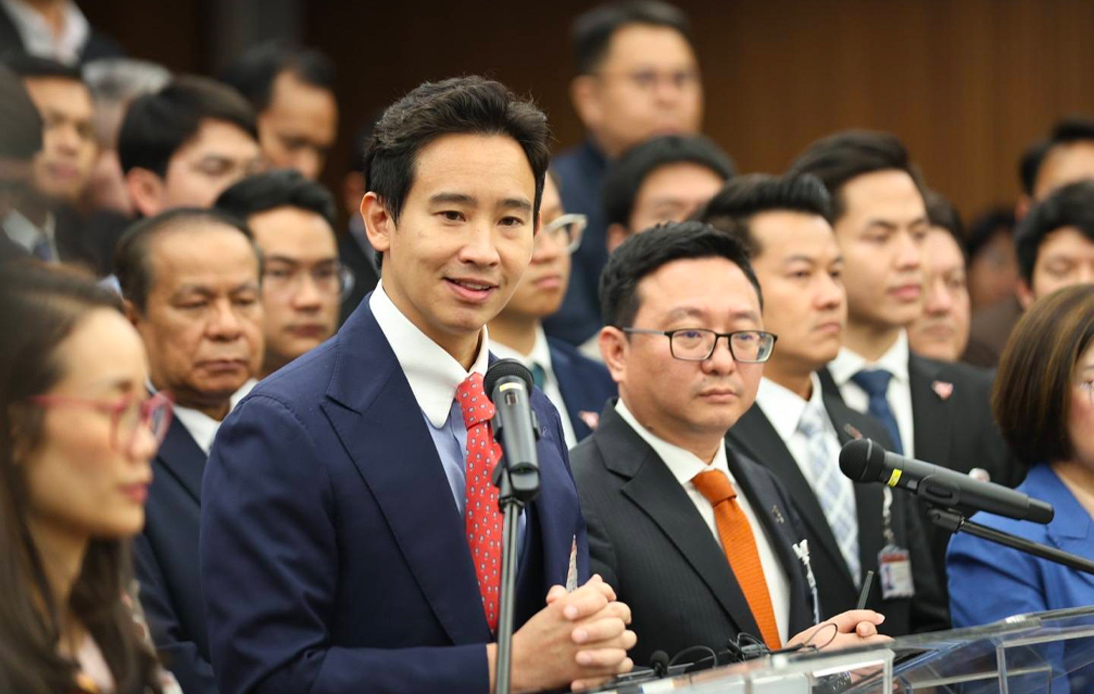
The Constitutional Court has ordered the Move Forward Party (MFP) to halt all efforts to revise the lese-majeste law, indicating that such advocacy is deemed an act against the constitutional monarchy.
The unanimous decision on Wednesday against the party, which received the highest number of votes — 14.4 million in the May 2023 election, might establish a benchmark for future evaluations of one of the strictest royal defamation laws in the world.
The applicability of the ruling to others who publicly discuss the royal defamation law remains uncertain.
Following the announcement of the decision, Move Forward’s leader, Chaithawat Tulathon, mentioned that the party awaits the official document from the court to determine their next course of action.
Although the party has accepted the verdict, Mr. Chaithawat expressed concerns that it would restrict future political dialogue on critical subjects.
The court’s interpretation that seeking to amend the royal defamation law signifies an attempt to dissociate the monarchy from the nation, posing a grave risk to national security, was a key part of its rationale.
The court did not exclude the potential for legal adjustments but stipulated that such discussions are only permissible within the legislative body. It deemed “campaigning” for law modifications in any public space, including online, as inappropriate.
Despite lacking authority to impose penalties on Move Forward in this case, the possibility of legal actions aimed at dissolving the party and barring its leaders from politics has been hinted at by some politicians.
Unsurprisingly, Ruangkrai Leekitwattana, a frequent filer of petitions and a previous critic of Move Forward, announced his plans to request that the Election Commission seek the party’s dissolution on Thursday.
Human Rights Watch highlighted a severe risk where 44 Move Forward MPs, who endorsed the amendment to Section 112, including former leader Pita Limjaroenrat, could face a permanent political ban for violating ethical standards.
The lese-majeste law, also known as Section 112 of the Criminal Code, imposes imprisonment for 3 to 15 years for any insult deemed against members of the royal family.
Proposed changes by Move Forward aimed to lessen penalties and necessitate filings by the royal household only.
Given the current scenario where anyone can lodge a lese-majeste complaint leading to mandatory police investigation, Move Forward and its supporters argue that Section 112 is often exploited for political motives.
The party’s stance has provoked anger among conservatives and was a principal factor in the failure of its government formation efforts last year, thwarted by the unelected Senate.
The case centered on Section 49 of the 2017 constitution, which guards against the misuse of rights and freedoms to undermine the monarchy.
The petition, initiated by Theerayut Suwankesorn, a lawyer known for defending activist monk Suwit Thongprasert during the Bangkok Shutdown protests, did not specifically seek the party’s dissolution, but Wednesday’s ruling could lead to a separate petition for that purpose.
Mr. Pita, now an advisory chairman for Move Forward, Mr. Chaithawat, and the party’s MPs were not present in court for the verdict. Instead, their lawyers represented them, and they watched the decision’s broadcast from a Parliament conference room.
In their deliberation, the judges cited previous initiatives by Mr. Pita and the party to amend Section 112, their involvement in campaigns against it, and their efforts to secure bail for individuals charged under the law.
The court highlighted that the proposed bill by the party’s 44 MPs on March 25, 2021, to amend Section 112, sought to diminish the royal institution’s stature by requiring the Bureau of the Royal Household to file complaints, potentially positioning it against the public in defamation cases.
This action was viewed as contravening the constitutional mandate that places the royal institution above political matters, underscoring its role in national security, according to the judges.
Furthermore, the court dismissed the party’s argument that their actions represented legitimate political expression, concluding they did not align with their professed intent of upholding the constitutional monarchy.




















